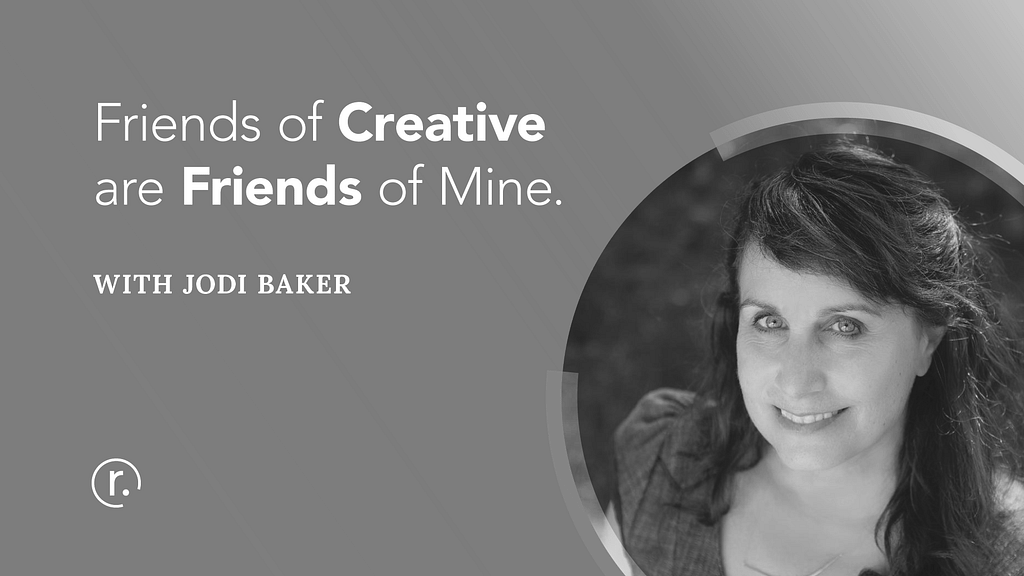Friends of Creative are Friends of Mine: Jodi Baker

Jodi Baker is a Creative Ops leader, a Bay Area transplant originally from Buffalo, NY, and a soon-to-be empty-nester when her son leaves for college next month. She fell into Creative Operations by way of agency and in-house project management roles where she discovered a passion for ‘the how’—the process of streamlining workflows and optimizing systems as teams faced the need to progress smoothly and stay on track of multiple deadlines.
I met Jodi at the beginning of the year through InsideOut, a Creative Leadership Community which is a custom-built space for senior leaders at high-profile brands where we share common challenges around in-house design, experience, and operations. As soon as I met Jodi, I realized this would be time well spent.
Jodi’s positivity and calming energy captivated me, as she and I exchanged creative ops stories and ultimately just “talked shop”. Her practical and tangible approach to leading teams and operations impressed me, so I had to learn more…
Streamlining the Process is a Form of Joy.
What makes you smile the most about what you do?
I like making things easier for teams at work so they can focus on what they’re hired to do, like creatives to focus on their craft. And some examples of that are creating a brief template that works for everyone, creating dashboards for teams, so they know what’s coming up and for accountability. All of this brings me joy!
Planning Can Help Build Trust.
What has been a favorite technique to apply with teams who need fine-tuning their processes?
I love planning in my personal life and at work. And in my personal life, it’s maybe to a fault, because I find myself less spontaneous. When I worked at Pandora, I initiated a planning and forecasting framework with our main partners. We would meet regularly with those stakeholders, to plan a couple of months or quarters ahead. This helped with resourcing and minimizing project delays and project launches. It helped build trust, accountability, and better relationships with the teams that we worked with.
Exceptional Leaders Play a Pivotal Role.
Can you point out a highlight in your career, as a Creative Ops leader?
For me, it was when I worked at Pandora. After about five months of starting a role as a project manager, there was an organizational restructure, which merged two creative teams. As a result of that reorg, a creative ops team was formed, we had never had a creative operations team. I reported to the head of ops, and learned so much over the next several years, not just about how to operationalize. But I also learned, you know, what a good leader looks like. I was inspired by the leadership around me, especially the strong female leaders. They set a great example I aspired to, and their guidance made a lasting impression on me.
Coaching People As an Act of Service.
You are always helping others. Such a beautiful “people-first” quality, why is this important to you?
I enjoy helping people and being a resource for people. This may stem from my teenage years when my first job was at a grocery store, and I waited tables. So at work, I love to coach people, especially those who are junior in their career, and support them with their goals and watch them grow. It just makes me so happy. To get a little woo-woo, one of my love languages is Acts of Service. So, it’s no surprise that I enjoy doing these things for others.
Surround Yourself with People Who Lift You Up.
What is the best piece of wisdom you have ever received?
If you’re working with people who are negative, all the negativity around can be contagious. Surround yourself with people who make you feel good, and can lift you up. If you’re at a company that may not have the best culture, and some of the values are not exactly what you’re agreeing with, you can still bring a positive culture to your team.
Empathy Is a Super-Strength.
What do others think is your greatest strength?
I was really torn with this one because I was thinking “What do I think are my greatest strengths”. So when I asked my colleagues, they all had different answers. I like to create this space for people to feel valued and acknowledge their success. So I am going with empathy.
Start Slow When Using AI Within Your Team.
What trends have you seen that have affected how teams stay organized?
Artificial Intelligence (AI) I had to come into this conversation at some point. I find that many organizations are rushing into using AI, but they lack the investment or resources and expect teams to figure it out. There are so many AI tools that can require experts, and I imagine we will start seeing them as their own role in Operations or part of a Tools Manager’s role. Teams have this pressure that they have to incorporate AI to bring greater efficiencies and be more productive, but may not know where to start.
Open Communication Creates Good Culture.
What is the number one “culture” seed you like to cultivate within?
Open communication is important to me to create an environment where team members feel heard and valued. By promoting open communication, people feel comfortable sharing ideas and providing and receiving feedback which helps build trust, collaboration, and problem-solving.